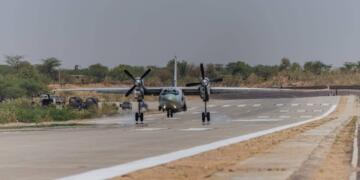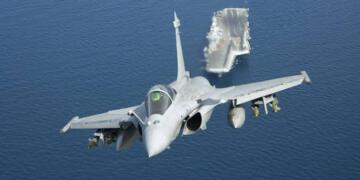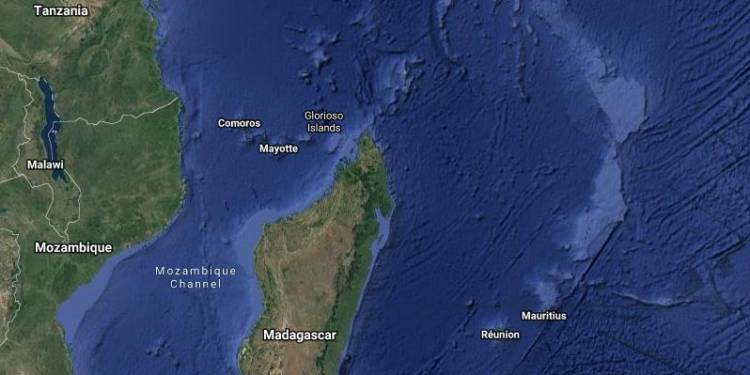Vice President Venkaiah Naidu is going to embark on an official visit to the Comoros and some other African nations this week. This could be a big opportunity for India to launch economic, defence cooperation with the island country. It must be noted that Vice President Naidu is the first senior Indian leader to visit the island nation of Comoros, where he would receive a warm welcome.
Comoros is eager to engage with India and it seems that New Delhi has finally shown up. With Comoros showing great interest in engaging with India and the latter is responding positively with the Vice President’s visit to the island country, India might be laying the groundwork for defence cooperation with yet another Vanilla island located at the Mozambique Channel.
https://services.tfipost.com
It is relevant to mention here that island nations in the Indian Ocean Region have started to realise their significance with the increasing relevance of their strategic locations as superpower nations engage in a brand new base race. These island countries no longer see themselves as mere specks of land in the vast ocean. Some of these island countries are now calling themselves large “Ocean States”, and aptly so given the vast exclusive economic zones (EEZ) to which they are entitled under the UNCLOS.
The Vanilla islands, known for the cultivation of Vanilla, consist of The Comoros, Madagascar, Mauritius, Mayotte, Reunion and Seychelles are located in and around the Mozambique channel thus having a crucial strategic location with respect to trade with African nations. While Mayotte and Reunion are French territories, the rest of these exotic island countries located in the Western Indian Ocean Region are independent. Earlier, the Vanilla Islands had lost much of their strategic importance after the construction of Suez Canal linking the Mediterranean and the Red Sea that allowed the European countries to bypass Africa.
However, with the emergence of Asian giants- China, Japan and India, the Vanilla island countries have once again come to boast of strategic importance. African resources are crucial for the brisk growth of these Asian powers. In the newly emerging geopolitical equations, these countries are recognising their newfound strategic importance and are therefore looking ahead for forging partnerships with the major powers.
India’s engagement with the Comoros may come at a crucial time in the face of the dragon country’s longstanding ambitions of transforming its Navy into a blue-water Navy which is looking to expand its influence in the Indian Ocean Region by raising military or commercial points at strategically located islands in order to encircle India and contain Indian influence in the region in accordance with the ‘String of Pearls’ theory. However, India is far from encircled. The Chinese strategy of jeopardising India’s standing in her own vicinity by building naval bases in the strategically located points of the Indian Ocean Region, has been effectively neutralised by India’s vigorous counter measures.
India has not shied away from expanding her presence and particularly in the recent past, it has shown great vigour in taking part in what can be described as emerging Sino-Indian competition for presence in the Indian Ocean Region. In fact, it has been New Delhi’s longstanding ambition to control narrow maritime chokepoints used by ships travelling through the Indian Ocean.
Setting up a tri-services Command Andaman and Nicobar Islands, the first and only tri-services Command of the Indian Defence Forces is an example of its strategy. The Andaman and Nicobar Islands sit at one end of the Malacca Strait and therefore India is now looking towards making greater use of its strategically crucial location.
When it comes to the Strait of Hormuz, which is also described as the world’s most important oil choke point, India has already gained an advantage with access to the port of Duqm in Oman that can be used for military purposes and logistical support.
The Chabahar port, which is yet another strategic point located on the Southeastern coast of the energy rich Iran, also gives India the opportunity of expanding its footprints in the Indian Ocean Region.
India’s access to the French base in Djibouti which sits at the Horn of Africa is yet another strategic vantage point for India, helping it counter the presence of the Chinese naval base there.
When it comes to the Mozambique channel, India seems to be enjoying a massive first mover’s advantage on account of its engagement with the Vanilla island countries. India is working towards building strategic military assets in two islands among the Vanilla islands- Agalega in Mauritius and Assumption in Seychelles, which have been leased to India.
The Coastal Radar facility has been operational since March 2016 in Seychelles and the island country also allowed India to set up military infrastructure on the island last year, which shows that India has been able to forge rather close ties with the strategically located vanilla island country.
This strategic advantage is further boosted by access to the US base, Diego Gracia in Mauritius. The finalisation of a logistics exchange agreement between India and France would also give former the access to the Reunion island, a French territory in the Vanilla Islands.
India’s listening post and radar facility in Northern Madagascar that is India’s first listening post on a foreign soil further strengthens its presence and position in the Indian Ocean Region.
With India’s engagement with the Comoros generating a lot of enthusiasm, India could for all practical purposes complete its strategic axis in the Mozambique channel. It need not be emphasised that this channel carries huge strategic importance at a time when the major Asian powers are dominating global growth and the African resources hold renewed significance in order to sustain their continuous growth. The road through the Mozambique Channel to African countries could be an awkward one for China in the near future if ever India so desires. It is to be seen to what extent India and the Vanilla country of Comoros strengthen ties in fields of economic and defence cooperation.






























